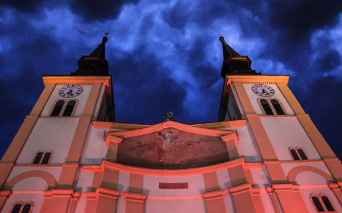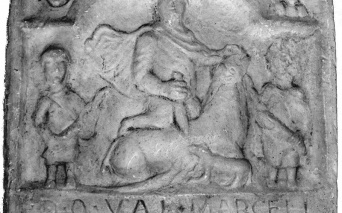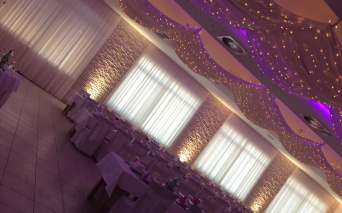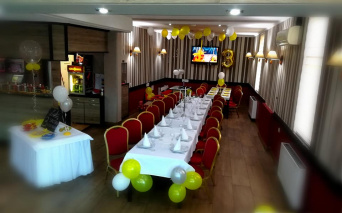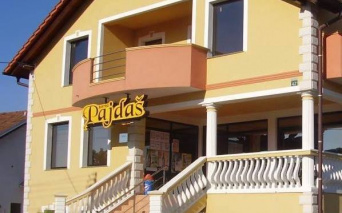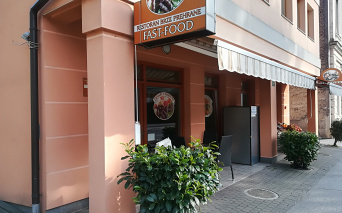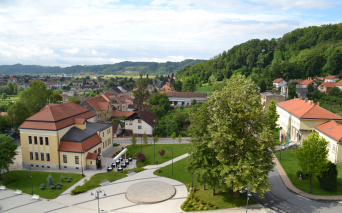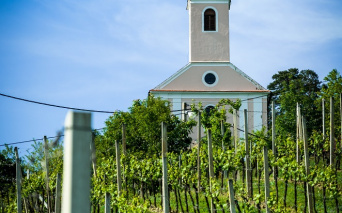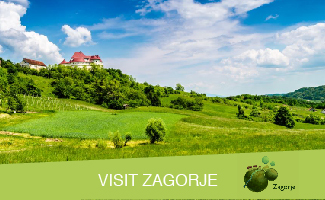Dobro došli u Pregradu
Grad Pregrada
Prelijep je položaj Pregrade. Otkuda to ime? Možda je nekada tu, gdje se prostrana ravnica uz Kosteljinu suzuje, bila nekada doista pregrada… U pozadini stoji gromada Kunagore, a majstor je graditelj tu postavio svoju velebnu crkvu, malu zagorsku biškupiju, dok se oko nje poredalo cijelo neveliko mjesto, nekada kotarsko, sada „sresko“, s nekoliko lijepih velikih domova. A na Kunagori čuva kapela sv. Leonarda ljude od groma! Prastara je to župa, ali stare crkve nema više, već je tu posljednja velika građevina crkvena iz 19. stoljeća, izvrsno građena, kako se pokazalo kad je arhitekt Martin Pilar crkvu snimio i narisao: sve minuciozno izvedeno. Lađa divot-prostor pod kubetom, svetište četverostrano, pročelje flankiraju dva vitka tornja, nad ulazom izvrstan fresko iz vremena postanja crkve iz godine 1818.
U toj su prekrasnoj građevini smjestili stare orgulje zagrebačke katedrale nad oltarom je 11 metara visoka slika, koju je dao biskup Alagović naslikati za katedralu, a god. 1842. poslao ju ovamo biskup Haulik, kad je svoj oltar dao postaviti u katedralu, ali taj je propao za velikoga potresa sasvim…
U toj je crkvi spomenik Simona Keglevića, pa se donator dao isklesati sa ženom i svom brojnom djecom, tu je pokopan i barun Collenbach, otac Emilije Keglević, koji je bio komandant armije u Zagrebu, a rođen u dalekom Aachenu, te je postao vitezom reda Marije Terezije. Taj je cijeli kraj bio domena Keglevića, tu je nedaleko dvor Gorica, s jednom kulom, tu je dvor Dubrava, kasnije svojina Badla, pravoga osnivača moderna kupališta u Krapinskim Toplicama, tu je veliki dvorac Bežanec, koji je bio u rukama obitelji Ottenfels…
Svrnuvši se još jednom unatrag moradosmo priznati veliku spremnost davno nestalom graditelju, koji je umio na najzgodnijem mjestu postaviti svoju divotnu crkvu i stopiti je s prirodom u jednu cjelinu! Od kapele sv. Fabijana i sv. Magdalene na Kunagori nalaze se još tragovi i ništa više, mada ih karta Beyschlagova još g. 1801. upisuje.
Kostel! Pravi „castellum“ strši s ruševinama i kreće svoju bastionsku kulu sablasno na cestu, tek ne prijeti nikomu više. Položen je izvrsno, samo s jedne je strane pristupačan. Tu su gospodovali knezovi Celjski, pa Jan Vitovec, Ivaniš Korvin, pa raspikuća knez Juraj Brandenburški, koji ga prodaje Keglevićima, a ti će ostati gospodarima do posljednjega, do Oskara Keglevića… Župa je u Kostelu prastara, već se spomenula u god. 1334… Par koračaja podalje stoji kapela Trpećeg Isusa, dograđena, možda god. 1800., vanredno skladna i zanimljiva.
Lijepo selo Sopot stislo se oko svoje crkvice sv. Mihalja, s osobito lijepo izrađenim tornjem od tesana kamena, valjda ostatkom starije građevine. I za malo vremena stvorismo se u Vinagori, gdje je župna crkva sa župnim stanom upravom monumentalno položena na istaknutom visu… Da pojača utisak kuće božje, izveo je stari majstor dvije kapele pred njom u formi kula, pa sve skupa čini vrlo lijep dojam… Ostalo mi je sve u jakoj uspomeni, jer je kod razgledanja zvona pukla daska poda mnom, pa me kapelan zahvatio za ruku i spasio.
Gjuro Szabo, Hrvatsko Zagorje
Pregrada je smještena na najzapadnijem dijelu Hrvatskog zagorja, u Krapinsko-zagorskoj županiji, između rijeke Sutle i padina Maceljske gore. Samo naselje smješteno je podno Kunagore u dolini koju tvori potok Kosteljina. U tom slikovitom brežuljkastom kraju, na razmjerno maloj površini ima osamdesetak mjesta, što zaselaka, što sela, a najveće je naselje Pregrada. Ostala naselja su: Benkovo, Bregi Kostelski, Bušin, Cigrovec, Donja Plemenšćina, Gabrovec, Gorjakovo, Gornja Plemenšćina, Klenice, Kostel, Kostelsko, Mala Gora, Marinec, Martiša Ves, Pavlovec Pregradski, Sopot, Stipernica, Svetojurski Vrhi, Valentinovo, Velika Gora, Vinagora, Vrhi Vinagorski, Višnjevec, Vojsak i Vrhi Pregradski.

Pregradski kraj je u srednjem vijeku pripadao kostelskom vlastelinstvu. Na sjevernim obroncima Kunagore još danas se naziru ostaci utvrde Kostelgrada. Ime Pregrada se prvi puta spominje 1334. godine u statutima Zagrebačkog Kaptola gdje se spominje župa sv. Emerika u Kostelu. Postoji nekoliko hipoteza o stvaranju imena. Prva tumači da je korito rijeke Kosteljine, koja prolazi kroz to mjesto, bilo pregrađeno nekakvom pregradom. Druga verzija kaže da je vlasnik Kostelgrada Juraj Branderbuški smjestio svoje obrambene čete "pred gradom", na padinama Kunagore te je tako nastalo ime Pregrada.
Grad ima površinu od 67km2, a prema posljednjem popisu stanovništva 2011. godine ima 6594 stanovnika. Udaljenost od autoceste i željeznice iznosi 25km, a od zračne luke Franjo Tuđman 71km. Pregrada je od Zagreba udaljena 66km, od Rijeke 209km, od Ljubljane 129km, a od Beča 322km.

Turistička zajednica područja Srce Zagorja
Zagrebačka 4, 49217 Krapinske Toplice
Tel 049 232 106
visit.srcezagorja@gmail.com
www.srcezagorja.hr
Izvor tekstova i slika: www.pregrada.hr, www.pregrada.info, arhiva Turističke zajednice područja Srce Zagorja, Tekstovi iz ostavštine Borisa Krizmanića, arhiva Gradske knjižnice Pregrada, Župa Pregrada, D. Botica: Izvori za povijest sakralne arhitekture na području Vrbovečkog arhiđakonata (17. – 19. st.), Leksikografski zavod Miroslav Krleža: Enciklopedija Hrvatskog zagorja, Gjuro Szabo, Hrvatsko Zagorje, Spektar, 1974., Josip Topić: Pregradske svečane pjesme i zdravice; Foto-studio Hrvo, Zajednica fotografa Pregrade, Dalibor Grilec, Ida Drenški, Darko Topolko, Vinko Krištić, Bojana Štruk, Josip Krušlin, Vedran Ferić, Hrvoje Šorša.

